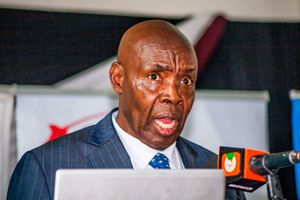
The Higher Education Loans Board offices in Nairobi. Helb and the placement agency will be disbanded and merged into a single entity.
The university students’ loans board and the placement agency will be disbanded and merged into a single entity in a draft law proposed by the Education Ministry.
The draft Bill that has been out for public debate proposes to create a new entity, Tertiary Education Placement and Funding Authority, that will be responsible for placement of students to tertiary education institutions, provide loans and scholarships to and give infrastructure funding to colleges.
The deadline for submission of public views on the proposal lapsed last week and the next step is to make necessary revisions based on presentations and then submit the Bill to Parliament for legislation.
At present, there are independent entities performing specific roles in higher education. These are the Higher Education Loans Board (Helb), which is responsible for giving students’ loans and bursaries, and the Kenya Universities and Colleges Central Placement Service (KUCCPS) that admits and places students in universities and colleges.
Others are the University Funding Board (UFB) that funds public universities, and the Technical and Vocational Education and Training Funding Board, that was supposed to provide funds to technical and vocational institutions but, which was non-operational. In so doing, the government seeks to consolidate all functions of managing and funding universities and colleges under one agency.
This means the government will scrap Helb, KUCCPS, Universities Fund Board, and the Technical and Vocational Education and Training Funding Board.
Merging higher education entities is not new. Until 2012, all public universities that existed then had their own individual Acts, but which were just duplicates of one another. All those laws were repealed and collapsed under the universities Act 2012. The then Commission for Higher Education (CHE) Act of 1985 was also repealed, and a new entity, the Commission of Universities Education (CUE), created under the Universities Act.
In its preamble, the new Bill states that the proposed law seeks to create a single authority that will be responsible for placing students and funding students in tertiary institutions and also funding infrastructure for the institutions.
Also Read: The sham that is Kenya's free education
Specifically, it will be responsible for placement of students to all accredited tertiary institutions, grant loans and scholarships to eligible students, provide funding for infrastructure development and maintenance in tertiary institutions and mobilise resources to supplement government’s capitation.
For good measure, the Bill stipulates that the authority will provide loans to students in public and private institutions, settling a matter that has been mired with a lot of controversies, with the contention that the government should not fund students in private universities.
On the whole, the plan to merge the various agencies is reasonable because it does not make sense to have single-mandate entities that could do better as departments in a well-structured organisation.
Until 2012, for example, admission and placement of students was done through an entity created by the universities then known as Joint Admission Board (JAB) that consisted of staff from the institutions under the guidance of the vice-chancellors’ committee. Similarly, funding was done directly to universities based on institution’s requirements.
Also Read: Public universities debt doubles to Sh75bn
As part of the transformation agenda for the Kenya Kwanza administration, the Ministry of Education has also published a revised Universities Bill to amend the Universities Act (2012). Among others, the revised Bill seeks to give the Commission for University Education (CUE) more powers and clarify its roles.
Thus, in the Universities Bill, 2024, the commission will be given the full mandate to accredit all courses offered by the universities, albeit in consultation with the professional bodies and interested parties.
In particular, the Bill seeks to cure an anomaly where the commission has a number of times in the past clashed with professional organisations such as the Engineers Board of Kenya over accreditation of courses and programmes in universities.
The revised universities law also proposes stricter management of courses and programmes. Universities will be required to revise courses after every six years and submit fresh applications for approval and accreditation, in a move intended to push the institutions to conduct regular modifications and upgrades of their courses.
“Every academic programme accredited by the commission, shall subsist for a period of six years,” says the Act. “Every university intending to continue offering an accredited academic programme, shall at least six months to expiry of the validity period, cause a review of the programme to determine its relevance and the capacity of the university to continue offering the programme.”
In an era where knowledge develops fast due to technology, the principle of regular updates of courses is desirable. It is the surest way of guaranteeing the relevance of the courses. To date, universities continue to offer some courses that are obsolete, a number hardly attracts applicants.
However, this will require the commission to reorganise and restructure itself to become an agile and flexible institution that can conduct rapid and regular course assessments. As currently configured, the commission is slow and rigid in its approval processes. The new move follows recommendations of the Presidential Working Party of Education Reforms that was established by President William Ruto in September 2022, and which presented its report in August 2023.
Broadly, the goal is to drive changes in higher education, which although has expanded exponentially in the past two decades, faces multiple challenges that undermine their capacity to deliver quality education.
However, although legal and policy issues have created administrative and structural challenges, the greatest hurdle is funding universities and colleges. It is on this score that the government must focus attention to pull the institutions out of the rut.
In total, the Ministry of Education has prepared 11 Bills and a Sessional Paper on a Policy Framework for Education Reforms in Kenya, 2024 to be submitted to Parliament for debate and approval.
- Aduda is a Consulting Editor and Education Specialist. [email protected]






